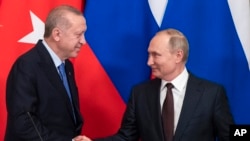Turkish president Recep Tayyip Erdogan visits Ukraine Thursday to mediate between Kyiv and Moscow amid rising tensions. Despite having close ties with both the Ukrainian and Russian presidents, analysts warn Erdogan faces a challenge on several fronts.
Turkish President Recep Tayyip Erdogan hopes to defuse tensions as Russia continues its military buildup near the Ukrainian border. Asli Aydintasbas, a senior fellow at the European Council, says Erdogan believes he is uniquely positioned to mediate.
“Turkey desperately wants to be the intermediary in this conflict: Erdogan wanting to use his relationship with Zelensky, the Ukrainian leader, the fact Turkey is a NATO country, and Erdogan, the Turkish president, really gets along with Putin. So, he has been offering to negotiate,” she said.
The Ukrainian president, Volodymyr Zelensky, has welcomed Erdogan's mediation efforts. But international relations professor Mustafa Aydin of Istanbul's Kadir Has University warns the Turkish leader is facing a tough challenge.
“Turkey is in a good place actually to mediate. My pessimism comes from the Russian perspective. I don't think Russia is looking for a mediation between itself — Russia — and Ukraine. They are looking to talk to the United States on the top level rather than Ukraine,” he said.
Putin's vague acceptance of Erdogan's offer last month to visit Turkey, saying he would only visit when the COVID epidemic permits, is seen by some analysts as an indication of Russia's reluctance for any Turkish medication role. Petro Burkovskiy, a senior fellow at the Democratic Initiatives Foundation in Kyiv, says Ukraine is aware of Turkey's limitations as a mediator but says Zelensky could be looking to Erdogan as a facilitator.
“I don't think Turkey can bring a lot to the table of negotiations. However, if Erdogan succeeds to arrange a personal meeting between Zelensky and Putin, Zelensky can use this opportunity domestically. If this talks are successful or productive, then it's really good for both Zelensky and for country. And if they are unsuccessful, he can say we've exhausted all variants; then now we have to do something else,” he said.
Ankara strongly opposes Russia's occupation of Crimea and has been supportive of Kyiv in its tense relationship with Moscow. Turkey is also selling armed drones to Ukraine in defiance of protests from Moscow.
Turkish companies are leading investors to Ukraine and Erdogan is expected to sign a free trade agreement during his visit.
Analyst Aydintasbas says such a stance will play well with Turkey's western partners.
“Ankara is seeing this as an opportunity to improve relations with NATO. Relations with Washington, they have really been up and down and sometimes quite tense over the last few years. So, the Ukraine crisis is a chance to polish Turkey's credentials as a NATO member,” she said.
But in a sign of the balancing act Turkey is performing, Ankara made a gesture to Moscow Monday reiterating its commitment to the Montreux Convention, which restricts warships’ access to the Black Sea, including those of NATO. With Turkey dependent on Russian gas and cooperation in Syria, analysts warn that Erdogan is aware Moscow can extract a heavy price on Turkey.





